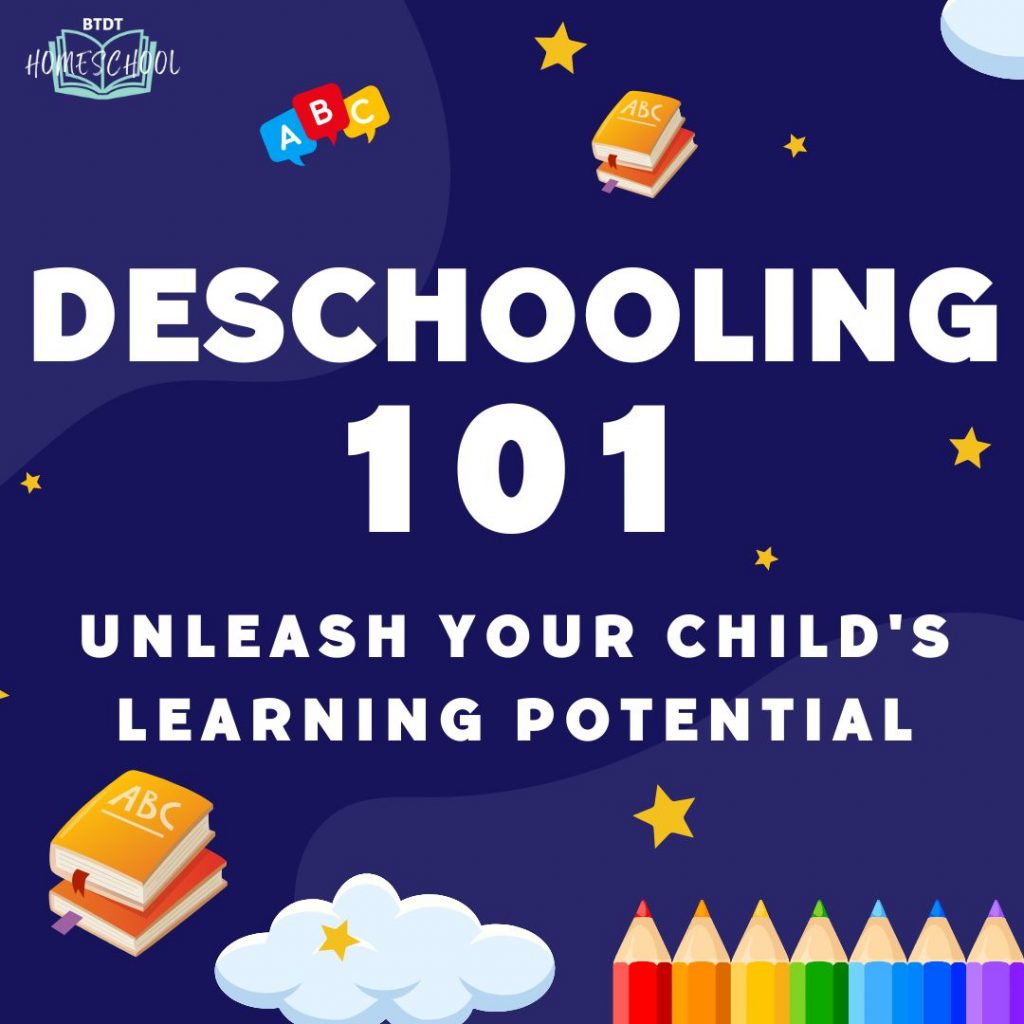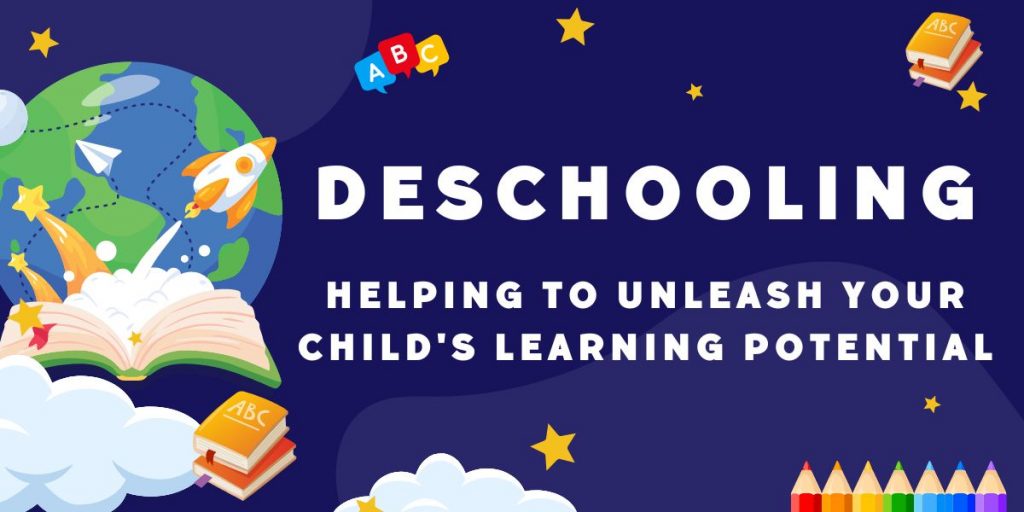034. Deschooling 101: A Vital Step to a Successful Homeschool

Scroll down for this week’s FREEBIE:
90 Deschooling and Boredom Idea List (pdf)
Brand New to Homeschooling?
GETTING START PAGE >>
Kindergarten Page >>
High School Series >>
Show Notes
Congratulations on your courageous decision to withdraw your child from the traditional school system and embrace the thrilling adventure of homeschooling! As you navigate this new territory, it’s natural to feel overwhelmed and uncertain about the next steps. Questions like which curriculum to use and how to get started might be racing through your mind. While your eagerness to dive right in is commendable, it’s vital not to overlook a critical step: deschooling. In today’s episode, Episode 34, we will delve into the concept of deschooling and highlight its importance after withdrawing your child from a school setting.
*A lot of people mix up the term “deschooling” with “unschooling.” These are not the same things. Unschooling is an actual homeschool philosophy and method. Deschooling is something totally different.
What Is Deschooling? (3:25)
It’s all about taking a break from the traditional curriculum and structured lessons. The idea behind it is to give your child some time to decompress from the regular school environment and rediscover their love for learning. It’s like a breather for them. During this period, they get to explore their interests, engage in unstructured play, pursue their hobbies, and just follow their curiosity wherever it takes them. It’s a chance for them to recharge and find joy in learning again. I want to clarify that deschooling is not mandatory for homeschooling, but it is highly recommended and plays a vital role in your overall success. However, it’s important to note that the duration of deschooling may vary depending on the specific circumstances. If you’re withdrawing your child from school due to a traumatic experience or a challenging situation, they might require more time for the deschooling process than others. Each child’s needs and circumstances are unique, so it’s essential to be flexible and allow them the time they require to transition effectively into homeschooling.
In the homeschooling realm, deschooling is like a superhero cape that equips your child with the tools they need to thrive. It’s a Temporary period of transition and adjustment that sets the stage for a successful homeschooling journey. Rushing into homeschooling without deschooling can potentially lead to disaster or set you back a bit. So taking the time to deschool is an absolute game-changer.
Deschooling marks a pivotal moment in your homeschooling journey—it’s an opportunity to break free from conventional educational norms and embrace a more personalized and meaningful approach. it’s a total game-changer for your homeschooling journey! It’s all about finding that spark of excitement for learning again and letting your kid be their awesome, unique self. You’re giving them the freedom to take charge of their own education and go on a wonderful adventure. So, take the leap, trust in the process, and witness the incredible growth and fulfillment comes with deschooling.
This period of time is also helpful to the homeschooling parent. You actually do have time to get your ducks in a row, do some homeschooling research, figure out what you think your homeschool philosophy or style will be. You actually do have time to figure things out and order supplies. There is no need to keep your child in a bad situation because you think you don’t have a plan. Pull them, deschool, take the time to figure things out all the way before you jump into this new adventure. You will not ruin your child of any age, or make them “behind” by taking this necessary time to deschool.
Deschooling – Is It Really That Important? Should I deschool? (7:18)
YES! This time of transition and adjustment is seriously important for a successful homeschooling journey. Rushing into homeschooling without deschooling especially after a traumatic experience can set you up for failure. Take the time to deschool. It’s like laying a solid foundation for the whole shebang. By giving your child the chance to decompress, rediscover their love for learning, and break free from the traditional school mindset, you’re setting them up for success. So, slow down, take a breather, and let that deschooling magic work its wonders.
- Embracing Emotional Healing:
- Deschooling provides a much-needed space for emotional healing. It allows your child to process any negative experiences from their time in traditional school, regain their confidence, and rediscover their love for learning. Rushing into homeschooling without this healing phase can lead to emotional burnout and resistance to education.
- Breaking Free from the School Mindset:
- Deschooling helps you and your child break free from the rigid mindset imposed by traditional schooling. It’s a chance to let go of the pressures, comparisons, and fixed ideas of what education should be. Rushing into homeschooling without deschooling may result in replicating the school environment at home, hindering the opportunity for a truly customized and enriching educational experience. You have the freedom to explore various learning approaches and adapt to your child’s unique needs and interests.
- Uncovering Interests and Passions:
- Deschooling allows your child to explore their interests and passions outside the boundaries of a set curriculum. It’s a time for them to engage in self-directed learning, dive deep into subjects they are curious about, and discover their unique talents. Rushing into homeschooling without deschooling may limit your child’s opportunity to explore and uncover their true passions.
- Unleashing Creativity:
- Deschooling unleashes your child’s creative powers. With no predetermined curriculum, they can delve into artistic pursuits, hands-on projects, imaginative play, and self-expression that fuels their passion and sparks their imagination.
- Establishing New Routines and Rhythms:
- Deschooling helps your family establish new routines and rhythms that work for your homeschooling lifestyle. It allows you to find a balance between structured learning and flexible exploration. Rushing into homeschooling without deschooling can result in feeling overwhelmed, disorganized, and struggling to find a sustainable rhythm.
- Strengthening Family Connections:
- Deschooling provides a precious opportunity to strengthen the bond within your family. It’s a time to reconnect, communicate, and build a solid foundation for your homeschooling journey. Rushing into homeschooling without deschooling may strain relationships and lead to additional stress and tension. And typically people are beginning this process because there’s already stress involved so don’t make it harder on yourself!
- Fostering Self-Directed Learning:
- Deschooling empowers your child to become a self-directed learner. They take charge of their education, set their own goals, and develop the essential skills of autonomy, critical thinking, and problem-solving.
- Developing a Growth Mindset:
- Deschooling fosters a growth mindset, where your child learns to embrace challenges, persevere, and view mistakes as valuable learning opportunities. Rushing into homeschooling without deschooling can inadvertently reinforce a fixed mindset, where mistakes are seen as failures and hinder the development of resilience and that love for learning that we want them to have. Up to this point, your children have been schooled. We want to educate them. Don’t get the two mixed up.
- Encouraging Real-World Experiences:
- Deschooling opens the door to real-world experiences. Your child can explore their community, engage in hands-on activities, participate in practical life skills, and discover the wonders of the world outside the classroom.
- Cultivating a Lifelong Love for Learning:
- Deschooling ignites a lifelong love for learning. By allowing your child to pursue their interests and passions, education becomes an exciting adventure filled with curiosity, exploration, and continuous growth.
In this exciting chapter of your homeschooling adventure, you’ll witness your child’s natural love for learning flourish as they uncover their unique passions and strengths. Deschooling empowers your family to create a vibrant educational atmosphere where curiosity reigns and creativity thrives. By stepping away from the traditional structures of education, you’ll discover a whole new world of possibilities where your child can truly shine.
How Do I Deschool? (15:09)
You may be wondering what your child should do all day without the traditional school structure. Fear not! Instead of worrying about how to fill their days, let your child’s interests and curiosity guide their learning journey. By fostering a nurturing environment that supports their passions, encouraging them to explore nature, dive into books, and engage in hands-on activities, you’ll witness the magic of deschooling unfold before your eyes. So, embrace this adventure, cherish the moments of discovery, and watch as your child thrives in a world of endless possibilities.
Let Imagination Take Flight
Encourage your child to let their imagination run wild, whether it’s creating their own stories, building epic forts, or designing intricate worlds. Imagination is a super valuable tool for exploration, problem-solving, and creative expression. And here’s the cool part—it’s not just for the little ones. Even your older children can benefit big time from this process. If they’ve been stuck in a school environment for most of their lives, it’s even more crucial for them to rediscover that natural curiosity that might have been buried deep down over the years. Let’s bring back that sense of wonder and let their imaginations soar! And I know for a lot of you with older students, you feel a lot of pressure as high school looms or possibly they are already in high school, but I assure you that you have more time than you realize. There’s so much time wasted in a school environment that you won’t need once you are homeschooling. Your older students will be amazed at what they can accomplish in a shorter amount of time per day, freeing them up to things they never had time for before.
Pursue Passions and Hobbies
Deschooling is the perfect time for your child to dive deep into their passions and hobbies. Whether it’s painting, playing a musical instrument, coding, or baking, deschooling will allow them the freedom and time to explore and develop their skills.
Explore the Great Outdoors
Nature is a treasure trove of learning opportunities. Encourage your child to spend time outside observing plants, animals, and the wonders of the natural world. Nature walks, gardening, or even a simple picnic can spark curiosity and foster a sense of wonder. Learn more about incorporating nature and nature study in your homeschool.
Dive Into the World of Books
Books are gateways to new worlds, ideas, and perspectives. Encourage your child to read for pleasure, exploring a variety of genres and subjects that captivate their interest. Visit the local library or create cozy reading nooks at home to ignite their love for literature.
Top 50 Books for New Readers
Favorite Books for Middle Schoolers
Be sure you spend time reading too! You can start with TOP 10 Books Every Homeschooler Should Read
Engage in Hands-On Experiments
Science experiments, Art projects, and DIY crafts are fantastic ways to engage your child’s curiosity and foster a love for learning. Encourage hands-on exploration, whether it’s building a volcano, creating a masterpiece, or conducting simple science experiments.
Pursue Community Involvement
Deschooling provides an opportunity to connect with the community and engage in meaningful experiences. Encourage your child to volunteer, join clubs or organizations, and participate in community events that align with their interests.
Watch Documentaries
This is a great time when you actually can say, go watch TV! There’s a million educational resources out there in shows and movies and documentaries to explore that you may not usually have time for anyway. Try Donuts and Documentaries Mondays!
Take Field Trips
Deschooling can also be a time to “sell” a reluctant kid on homeschooling. Maybe they needed to come home for reasons they don’t quite understand or are on board with? This is a great time to show them what one of our favorite benefits of homeschooling is- getting to have hands-on experiences in museums and parks and other places during the day, when we have these places all to ourselves!
Deschooling opens up a world of possibilities for your child’s day-to-day activities. Rather than worrying about filling every minute with structured tasks, embrace the freedom and flexibility that deschooling offers. Encourage your child to follow their passions, explore the world around them, and indulge in activities that spark joy and curiosity. Remember, deschooling is a time of self-discovery, growth, and nurturing a love for learning. And remember, deschooling is for you, too. This is when you can be doing some thinking about what your worldview is, what your goals are for your kids, what homeschooling style you think would suit your family. You can be doing a ton of reading and researching during this time. So, let go of expectations, embrace the adventure, and watch as your child’s days unfold with wonder, excitement, and endless opportunities for growth.
This Week’s FREEBIE:
How long should we deschool? (24:19)
Deschooling is a personalized process that should be tailored to your child’s unique needs and readiness. The duration of deschooling can vary, but it’s crucial to observe your child’s readiness indicators, their level of independence, and their learning goals. By embracing flexibility and keeping a pulse on their interests and curiosity, you’ll be able to determine the right time to introduce a curriculum that complements their learning journey.
Some people like to throw out suggestions like one month for every year of school, but this is really a very personal choice. Don’t just deschool for winter break or over the summer- often you were going to take that break anyway, so it may not be enough of a definitive time to give you the results you want. Remember, homeschooling is a dynamic and adaptable adventure, and finding the perfect balance between deschooling and starting a curriculum will set the stage for a fulfilling educational experience.
You may just want to ease into the next thing, too. Perhaps you had a student who was really struggling with just one subject. It’s totally ok to just do math, or really just focus on reading comprehension for a while and just slowly roll back into some kind of structured homeschool day, one subject at a time.
Do Schools Kill Creativity? | Sir Ken Robinson
One of the most profound and highest rated TED Talks
Sir Ken Robinson makes an entertaining and profoundly moving case for creating an education system that nurtures (rather than undermines) creativity.
The Deschooling Effect: Reconnecting with Your Child This article explores the positive impact of deschooling on parent-child relationships and emphasizes the importance of reconnecting with your child during the transition.




